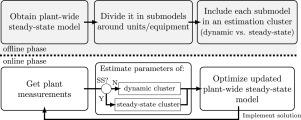当前位置:
X-MOL 学术
›
J. Process Control
›
论文详情
Our official English website, www.x-mol.net, welcomes your
feedback! (Note: you will need to create a separate account there.)
Plantwide optimization via real-time optimization with persistent parameter adaptation
Journal of Process Control ( IF 3.3 ) Pub Date : 2020-08-01 , DOI: 10.1016/j.jprocont.2020.05.006 José O.A. Matias , Galo A.C. Le Roux
Journal of Process Control ( IF 3.3 ) Pub Date : 2020-08-01 , DOI: 10.1016/j.jprocont.2020.05.006 José O.A. Matias , Galo A.C. Le Roux

|
Abstract Determining the optimization scope is a major issue whenever implementing Real-time Optimization (RTO). Ideally, the optimization problem should encompass the whole plant and not a single unit, which represents only a local subset of the problem. However, if the standard RTO method, the two-step approach (TS), is applied to the entire plant, the whole system needs to be at steady-state (SS) in order to initiate the optimization cycle. This condition is rarely found in practice. One alternative is to apply Real-time Optimization with Persistent Parameter Adaptation (ROPA). ROPA is an RTO variant that integrates online estimators to the standard TS framework and avoids the need of waiting for steady-state to trigger the optimization cycle. However, the problem shifts to obtaining a dynamic model of the entire plant, which can be challenging and time consuming. This paper proposes a variant of ROPA, named asynchronous ROPA (asROPA), where the plant-wide model is partitioned into submodels and, depending on their characteristics, their parameters are updated using either online or steady-state estimators. Consequently, it is not necessary to obtain a dynamic model for the whole process. This asynchronous updating strategy allows the plant-wide model to be up-to-date to the process and the plant-wide optimization can be scheduled at any arbitrary time. The new strategy is applied to a case study consisting of a system whose model can be partitioned into a separation and a reaction submodel. The plant-wide results indicate that asROPA reacts much faster to the disturbances in comparison to the TS approach, improving the overall economic performance and is able to drive the system to the plant-wide optimum. Additionally, a strategy for partitioning the process and choosing the estimation strategy for each partition is proposed.
中文翻译:

通过具有持续参数自适应的实时优化实现全厂优化
摘要 在实现实时优化(RTO)时,确定优化范围是一个主要问题。理想情况下,优化问题应该包含整个工厂,而不是单个单元,它仅代表问题的局部子集。但是,如果将标准 RTO 方法,即两步法 (TS) 应用于整个工厂,则整个系统需要处于稳态 (SS) 才能启动优化周期。这种情况在实践中很少发现。一种替代方法是应用具有持续参数自适应 (ROPA) 的实时优化。ROPA 是一种 RTO 变体,它将在线估算器集成到标准 TS 框架中,避免了等待稳态触发优化循环的需要。然而,问题转移到获得整个工厂的动态模型,这可能具有挑战性且耗时。本文提出了一种名为异步 ROPA (asROPA) 的 ROPA 变体,其中全厂模型被划分为子模型,并根据它们的特性,使用在线或稳态估计器更新它们的参数。因此,没有必要获得整个过程的动态模型。这种异步更新策略允许工厂范围的模型与过程保持同步,并且可以在任意时间安排工厂范围的优化。新策略应用于由系统组成的案例研究,该系统的模型可以划分为分离子模型和反应子模型。全厂范围的结果表明,与 TS 方法相比,asROPA 对干扰的反应要快得多,提高整体经济性能,并能够将系统驱动到全厂范围内的最佳状态。此外,还提出了一种对过程进行分区并为每个分区选择估计策略的策略。
更新日期:2020-08-01
中文翻译:

通过具有持续参数自适应的实时优化实现全厂优化
摘要 在实现实时优化(RTO)时,确定优化范围是一个主要问题。理想情况下,优化问题应该包含整个工厂,而不是单个单元,它仅代表问题的局部子集。但是,如果将标准 RTO 方法,即两步法 (TS) 应用于整个工厂,则整个系统需要处于稳态 (SS) 才能启动优化周期。这种情况在实践中很少发现。一种替代方法是应用具有持续参数自适应 (ROPA) 的实时优化。ROPA 是一种 RTO 变体,它将在线估算器集成到标准 TS 框架中,避免了等待稳态触发优化循环的需要。然而,问题转移到获得整个工厂的动态模型,这可能具有挑战性且耗时。本文提出了一种名为异步 ROPA (asROPA) 的 ROPA 变体,其中全厂模型被划分为子模型,并根据它们的特性,使用在线或稳态估计器更新它们的参数。因此,没有必要获得整个过程的动态模型。这种异步更新策略允许工厂范围的模型与过程保持同步,并且可以在任意时间安排工厂范围的优化。新策略应用于由系统组成的案例研究,该系统的模型可以划分为分离子模型和反应子模型。全厂范围的结果表明,与 TS 方法相比,asROPA 对干扰的反应要快得多,提高整体经济性能,并能够将系统驱动到全厂范围内的最佳状态。此外,还提出了一种对过程进行分区并为每个分区选择估计策略的策略。











































 京公网安备 11010802027423号
京公网安备 11010802027423号